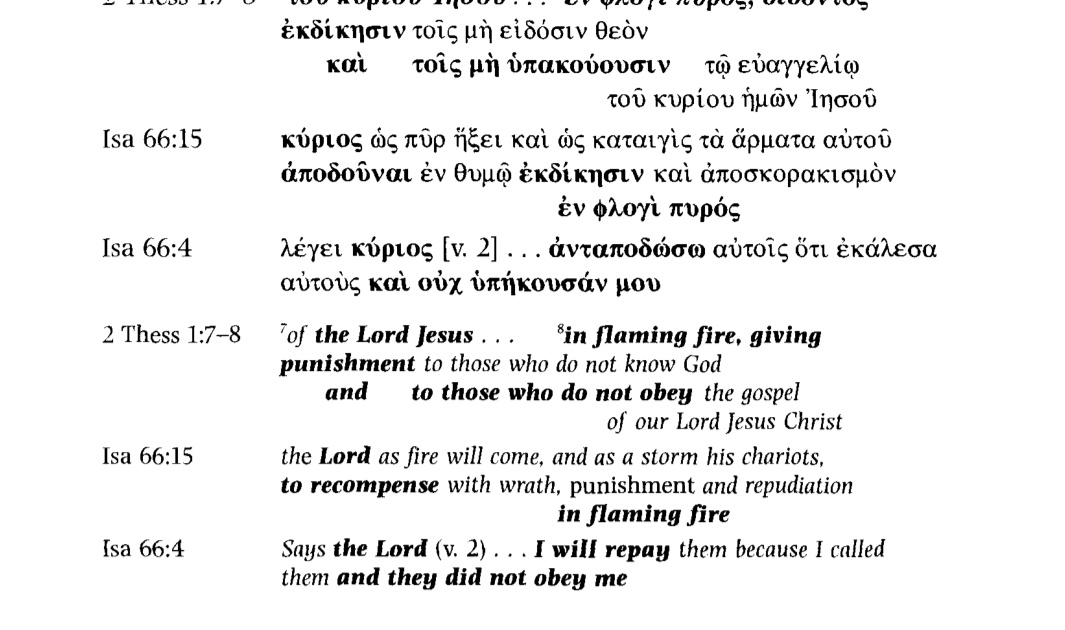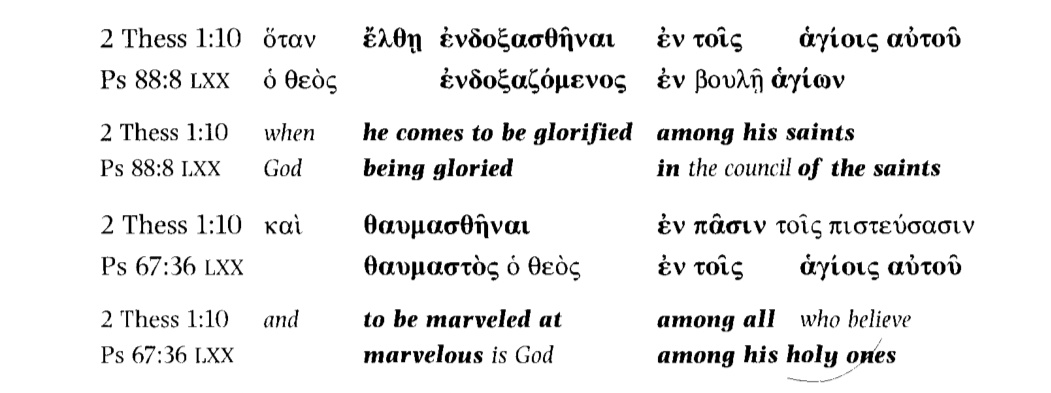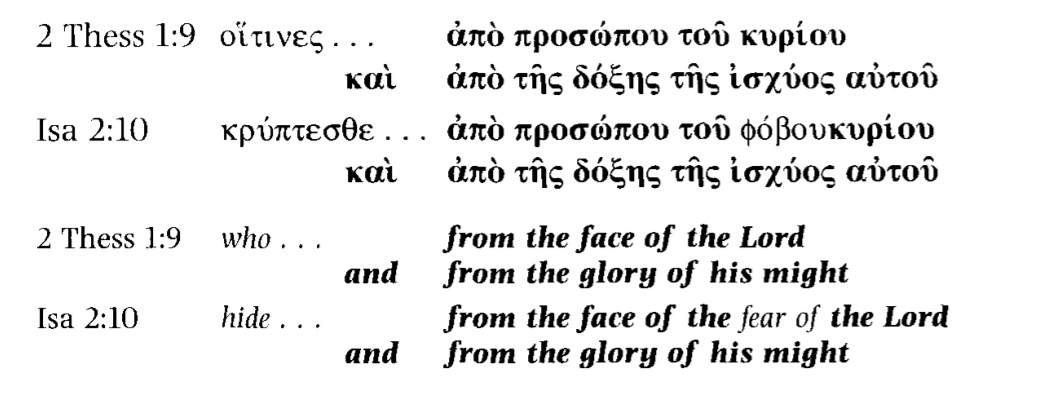13) 1 Thessalonians:
In 3:13 Paul applies a text about the coming of the God of Israel (Zechariah 14:5 LXX) with the coming of Jesus. In the preceding verse Paul uses a singular verb (may He direct...) when praying to both the Father and Jesus which shows unity of action.
In 3:13 Paul applies a text about the coming of the God of Israel (Zechariah 14:5 LXX) with the coming of Jesus. In the preceding verse Paul uses a singular verb (may He direct...) when praying to both the Father and Jesus which shows unity of action.
14) 2 Thessalonians: Paul begins by amalgamating various OT texts about the God of Israel to Jesus at His Parousia (parallels again from Gordon Fee):
I would argue 2 Thessalonians 1:12 also refers to Christ as "God and Lord" although this is a minority opinion. The debate is over whether "Lord" is a proper name in the verse or not, as Sharp's rule does not apply to proper names. Still, grammatically speaking the rule applies.
15) 1 Timothy:
1:15 talks of Jesus "coming into the world" to save sinners which is a strong statement of pre-existence in light of other Epistles in the Pauline corpus.
3:16 talks of Jesus being "manifest in the flesh" which is strongly incarnational language.
1:15 talks of Jesus "coming into the world" to save sinners which is a strong statement of pre-existence in light of other Epistles in the Pauline corpus.
3:16 talks of Jesus being "manifest in the flesh" which is strongly incarnational language.
16) 2 Timothy:
In 4:14 Christ is again named the cosmic Judge of all creation, confirmed by Paul's quote of Psalm 61:13 (LXX) and Proverbs 24:12. This is a uniquely divine prerogative in the OT (and I should note, in the Quran as well).
In 4:14 Christ is again named the cosmic Judge of all creation, confirmed by Paul's quote of Psalm 61:13 (LXX) and Proverbs 24:12. This is a uniquely divine prerogative in the OT (and I should note, in the Quran as well).
In 4:1, Paul looks towards the "appearing" of Christ. This was normative language for the appearance of a deity in a Greco-Roman context. Cf. Bowman and Komoszewski.
17) Titus:
The most discussed passage in this Epistle is undoubtedly 2:13, where the vast majority of commentators today see a reference to Jesus as "our Great God and Savior". This is also the historical patristic and liturgical view of the Church. Sharp's rule applies again.
The most discussed passage in this Epistle is undoubtedly 2:13, where the vast majority of commentators today see a reference to Jesus as "our Great God and Savior". This is also the historical patristic and liturgical view of the Church. Sharp's rule applies again.
18) Philemon and excurxus on NT Letter openings:
Practically all of the NT Epistles open with a "greeting" wishing "grace and peace from God the Father and the Lord Jesus Christ". (Cf. Philemon 3)
This is very close to the Aaronic blessing of Numbers 6:
Practically all of the NT Epistles open with a "greeting" wishing "grace and peace from God the Father and the Lord Jesus Christ". (Cf. Philemon 3)
This is very close to the Aaronic blessing of Numbers 6:
"the Lord make his face to shine upon you and be GRACIOUS to you; the Lord lift up his countenance upon you and give you PEACE.
(6:25-26)
(6:25-26)
Notice how the Epistles pick up 2 motifs from the blessing and apply them to God the Father and Jesus Christ both as equal source of said grace and peace to the Churches. This both shows the sovereignty as well as the ongoing activity of Christ among the apostolic churches.
19) Hebrews:
To say Hebrews is an embarrassment of riches when it comes to Christology would be an understatement. I will just highlight some key verses.
In 1:2 it is stated again that Jesus is the agent of creation, as God created the world through the Son.
To say Hebrews is an embarrassment of riches when it comes to Christology would be an understatement. I will just highlight some key verses.
In 1:2 it is stated again that Jesus is the agent of creation, as God created the world through the Son.
In 1:3 the Son is called the radiance of God's glory and the exact representation of His being who UPHOLDS ALL THINGS by His power. Who but God upholds creation and represents God's BEING exactly?
In 1:4, the Son is said to have received "a name superior to the angels by inheritance". In light of v. 1 where the Son is "the heir of all things" this "Name" is undoubtedly the divine name as sons inherit the names and titles of their fathers.
In 1:6 an OT text about the worship of angels towards God (namely Ps 96:7 and Deuteronomy 32:43, both LXX) is applied to Jesus. I
In 1:8, Jesus is called God BY THE FATHER, and it is said His throne is eternal, according to the clearest reading of the text (the alternative reading of "God is your throne..." has little support today in academia and is seemingly nonsensical, who sits on God?)
In 1:10-12, Psalm 102:25-27 is applied to Jesus where He is called "Lord" again by the Father, and is named the immutable creator of heaven and earth (cf. 1:2). Again, the original referent is the God of Israel whereas the referent becomes Jesus with ease.
In 10:5-6 Christ is speaking and saying to the Father "a body You prepared for Me" which is strongly incarnational. This seems to make no sense in a reading where Jesus is said to be a mere human.
20) James:
1:1 identifies James as the "slave of Jesus Christ...", and 2:1 identifies Him as the "Lord of Glory" (cf. King of Glory in Ps 23 and the same title in 1 Corinthians 2:8)
1:1 identifies James as the "slave of Jesus Christ...", and 2:1 identifies Him as the "Lord of Glory" (cf. King of Glory in Ps 23 and the same title in 1 Corinthians 2:8)
Throughout James 5, the repeated usage of "Lord" with ambiguous referents (Jesus is in view surely at 5:6 and 5:9) underscores how closely the identity of God and Jesus are intertwined.
See David Wyman's treatment here: https://www.academia.edu/26414738/Jamess_Divine_Christology
See David Wyman's treatment here: https://www.academia.edu/26414738/Jamess_Divine_Christology
21) 1 Peter:
1:11 again calls the Holy Spirit "the Spirit of Christ" which is tantalizing in light of the OT affirmations of the Spirit as GOD's Spirit.
3:14-15 quotes Isaiah 8:12-13 LXX and modifies the verse slightly to interpret "the Lord" of Isaiah 8:12 as Jesus.
1:11 again calls the Holy Spirit "the Spirit of Christ" which is tantalizing in light of the OT affirmations of the Spirit as GOD's Spirit.
3:14-15 quotes Isaiah 8:12-13 LXX and modifies the verse slightly to interpret "the Lord" of Isaiah 8:12 as Jesus.
22) 2 Peter
1:1 Again has "our God and Savior, Jesus Christ". In light of the verbatim phrase in 1:11, 2:20, 3:18 where "Lord" replaces "God", the opening almost certainly calls Jesus God. No one would entertain two referents in those other passages, so why here?
1:1 Again has "our God and Savior, Jesus Christ". In light of the verbatim phrase in 1:11, 2:20, 3:18 where "Lord" replaces "God", the opening almost certainly calls Jesus God. No one would entertain two referents in those other passages, so why here?
1:3 talks of "His divine power" which seemingly goes back to Jesus in v. 2 as He is the last referent.
3:10 takes the OT phrase "day of the Lord" and applies it to Jesus, as the immediate context is the Parousia (cf. Philippians 1:10, "day of Christ") and people who mock it.
3:10 takes the OT phrase "day of the Lord" and applies it to Jesus, as the immediate context is the Parousia (cf. Philippians 1:10, "day of Christ") and people who mock it.
23) 1 John:
The Epistle opens with calling Jesus "the Word of Life" that the faithful saw and touched with their hands (cf. John 1:1) and "eternal life" that came from the Father.
2:23 says those who deny the Son do not have the Father either which my interlocutor should note.
The Epistle opens with calling Jesus "the Word of Life" that the faithful saw and touched with their hands (cf. John 1:1) and "eternal life" that came from the Father.
2:23 says those who deny the Son do not have the Father either which my interlocutor should note.
5:20 is historically taken as an affirmation of Jesus as "true God and eternal life".
Quite a few points support this reading, like John's normative use of "houtos" (this/he), and how the Epistle opens with calling Jesus eternal life, something the Father is never called.
Quite a few points support this reading, like John's normative use of "houtos" (this/he), and how the Epistle opens with calling Jesus eternal life, something the Father is never called.

 Read on Twitter
Read on Twitter








